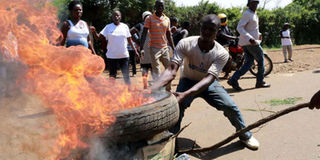Shambolic nominations undermine democracy

Youths light bonfires on the streets of Kisumu town on April 26, 2017. They were protesting against MP Ken Obura who they claimed was controversially awarded an ODM nomination certificate to run as Kisumu Central Member of Parliament. PHOTO | TONNY OMONDI | NATION MEDIA GROUP
What you need to know:
- The larger political parties kept shifting the dates of their primaries up to the last moment, with some of them being cancelled at the very last minute.
- A party must have a manifesto to provide a governance roadmap for anyone who cares to look.
- The party must have a mechanism for selecting its leaders with the aim of attracting charismatic politicians who also share the party philosophy.
- Our political parties do not seem to have manifestoes to implement after the elections.
Over the past couple of weeks we have witnessed political party nominations for the coming General Election.
Since the election date is constitutionally fixed, and a clear schedule of events leading up to the event was issued in very good time, all prospective aspirants and their political parties should have prepared adequately for the nomination and ensure that the will of the party members is expressed unequivocally.
What happened instead is a comedy of epic proportions.
The larger political parties, including the ruling coalition, kept shifting the dates of their primaries up to the last moment, with some of them being cancelled at the very last minute.
This lack of preparation is astounding, seeing as these parties are positioning themselves as possible wielders of state power after the next elections.
PARTY PRIMARIES
Far more troubling, though, was the conduct of the party primaries themselves.
One would have expected that during party primaries, the organisers would ensure only party members participated and selected candidates who reflect party ideals.
Unfortunately this was not the case.
There are certain qualities of a proper political party that are lacking in our clownish formations.
First, a party must have a manifesto to provide a governance roadmap for anyone who cares to look.
The manifesto would operationalise the party’s philosophy and outline activities aimed at achieving the party’s vision for the country should it be given the governing mandate by the people.
RETAIN SUPPORTERS
It is designed to attract and retain supporters, giving them a clear reason to want the party to win.
Second, the party must have a mechanism for selecting its leaders with the aim of attracting charismatic politicians who also share the party philosophy and believe in the ideals articulated in the manifesto.
The leaders will be vetted to ensure they espouse party ideals and, after their election, they will be the public face of the party and its philosophy.
They will take the party manifesto and break it down for the people, complete with catchy slogans that appeal to potential voters.
Finally, the party will ensure primaries are organised flawlessly in order to attract only the candidates who share in their vision and are enthusiastic about selling the manifesto to the masses, and implementing it should they win power.
CREDIBLE PARTY
To ensure this happens, a credible party will recruit members well in advance of an election, and energise them with regular party events at which party ideals are repeated and internalised.
It is from the ranks of these members that charismatic leaders are identified and promoted, and eventually allowed to vie for positions in general elections.
This deliberate process ensures only people who believe in the party’s ideals will participate in its activities, and that only those that carry the party’s vision are allowed to lead it and vie for positions on its platform.
A useful feature of this process is that it is open and transparent, and all voters can hold the party accountable for its promises.
The party leaders have a clear understanding that they owe it to the members and other citizens to implement the party manifesto.
ELIGIBILITY TO VOTE
The sham that happened in this country over the past two weeks cannot even remotely resemble organised party primaries, and this is obviously a result of structural defects in the parties themselves.
Our political parties do not seem to have manifestoes to implement after the elections, and those that do have done such a poor copy-paste job that even their leaders cannot articulate anything in the documents.
Further, the parties have no real members, and the party leadership is not decided by the members, but by the “owners”.
As a result, the party primaries were free-for-all affairs, and in many places no attempt was made to use any kind of register to determine eligibility to vote.
Indeed, it was hilarious to watch vocal supporters of one party queuing to vote in the rival party’s primaries.
This raises the question: Do we really need political parties in the governance system?
Lukoye Atwoli is Associate Professor and Dean, Moi University School of Medicine [email protected]





